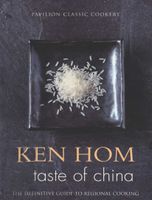🔥 Celebrate new books on our BBQ & Grilling shelf with 25% off ckbk membership 🔥
The Imperial Legacy
By Ken Hom
Published 1990
The imperial court, like the forbidden city, was an isolated entity. Since the dawn of China’s political history more than two thousand years ago, when the country was unified in 220 B.C., the Chinese have experienced severe constraints on their political freedom. The first Emperor, Qin Shihuang, and those who followed, repressed all dissent. Over the centuries, in order to survive, the people had to sublimate their political and other social energies. They channelled their creative powers into art, literature, religious philosophy, and finally, their cuisine. Chinese chefs were rewarded for displaying excellence in their profession. Those who were innovative, experimental, freely creative often rose to the highest levels of the Imperial Court, their unfettered, politically innocuous creativity radiating into Chinese society. Its influence is still to be felt.
Become a Premium Member to access this page
Unlimited, ad-free access to hundreds of the world’s best cookbooks
Over 150,000 recipes with thousands more added every month
Recommended by leading chefs and food writers
Powerful search filters to match your tastes
Create collections and add reviews or private notes to any recipe
Swipe to browse each cookbook from cover-to-cover
Manage your subscription via the My Membership page
In this section
Advertisement
Advertisement


